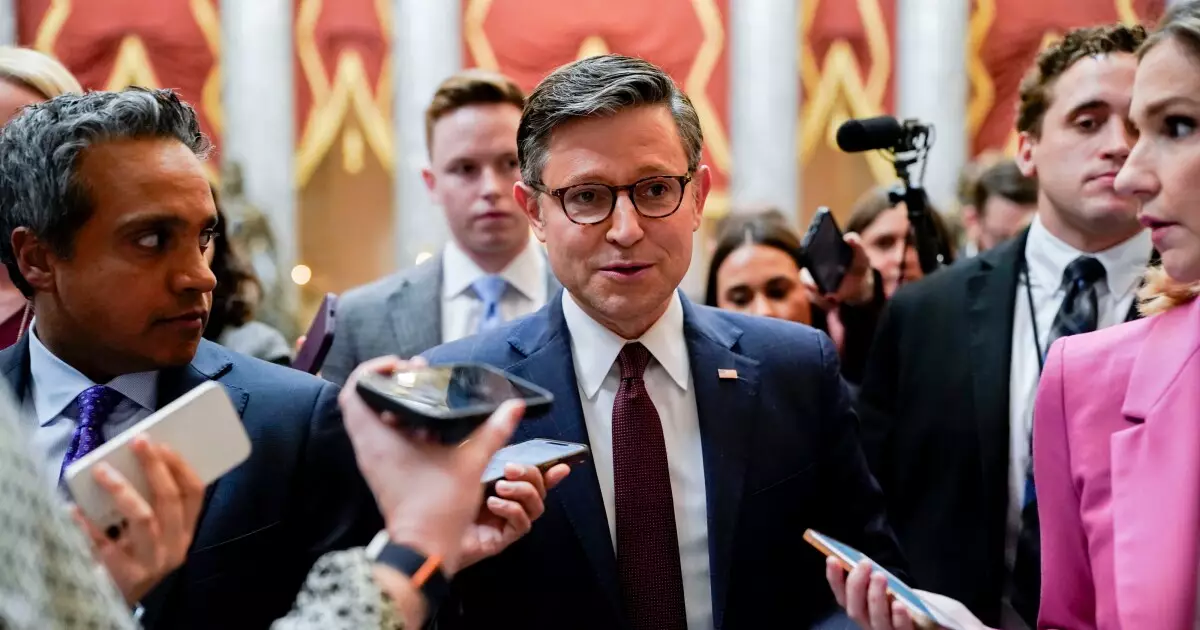The recent passage of a budget resolution by the U.S. House of Representatives on Tuesday marks a significant leap toward comprehensive tax reform, a development that has captured the attention of various stakeholders in the municipal market. With a narrow margin of victory, this resolution not only emphasizes the House Republicans’ commitment to the “America First” agenda promoted by former President Trump but also unveils the complexities and potential pitfalls that lie ahead in the negotiations between the House and the Senate.
The final vote tally of 217-215 underscores the precarious nature of the Republican majority in the House. With a slim majority of 218-215, the GOP’s ability to push through such critical legislation reflects a delicate balancing act within the party. House Speaker Mike Johnson, a key figure in this legislative endeavor, hailed the vote as a celebration of party unity and progress. However, the fact that only one Republican, Rep. Thomas Massie of Kentucky, opposed the resolution raises questions about intra-party cohesion and the likelihood of similar challenges in future votes.
The bipartisan dynamics of governance are increasingly strained in such a tight majority situation. This budget resolution propels the House Republicans further into the budget reconciliation process, a mechanism designed to pass certain types of legislation with a simple majority. The tension inherent in achieving consensus among party members is palpable, especially as they advance toward potentially contentious negotiations with the Senate.
Understanding the Budget Framework: Goals and Challenges
The budget framework itself encompasses ambitious goals, including $4.5 trillion in tax cuts, largely centered around extending the 2017 Tax Cuts and Jobs Act (TCJA). The $2 trillion cut earmarked for programs like Medicaid signifies a drastic shift in fiscal policy priorities, drawing criticism and support from various corners. It signals a potential transformation in social safety net programs, which could be a polarizing topic among lawmakers and constituents alike.
Moreover, the proposed budget raises the debt ceiling by an additional $4 trillion, igniting further debates about fiscal responsibility. This ambitious financial roadmap relies heavily on the willingness of House Republicans to navigate both their intraparty divisions and the demands of the Senate, which has shown a preference for a more conservative approach to tax reform.
A crucial aspect of this budget resolution is its potential impact on the municipal bond market, particularly regarding any attempts to modify or eliminate tax exemptions on municipal bond interest. As lawmakers seek to offset the fiscal implications of substantial tax cuts, the municipal finance community is on high alert, advocating against any legislative measures that threaten these critical exemptions.
Furthermore, the Congressional Budget Office has projected the cost of extending the TCJA at an eye-popping $4.7 trillion, introducing substantial fiscal challenges. The specter of eliminating tax exemptions has been explicitly mentioned, and advocacy efforts to safeguard these provisions from legislative scrutiny are ramping up amid mounting uncertainty.
Future Negotiations and Political Landscape
As the House prepares for negotiations with Senate Republicans, the complexity of reconciling different budget resolutions cannot be overstated. The Senate has already proposed a budget resolution that diverges from the House’s approach, thereby potentially complicating bipartisan discussions. Senate Committee Chair Lindsey Graham’s characterization of the House’s proposed $4.5 trillion cuts as a “nonstarter” indicates significant ideological differences that will need to be bridged.
Moreover, the political timing is critical. With a looming government shutdown deadline of March 14, pressure is mounting on lawmakers to find common ground quickly. High-stakes meetings scheduled between Republican leaders and Treasury Secretary Scott Bessent signal the urgency of reaching an accord on tax policy amidst the backdrop of broader fiscal governance.
While the passage of the budget resolution is a noteworthy achievement for House Republicans, the complexity and uncertainties of the legislative process still pose formidable challenges. The evolving political landscape requires careful navigation as party leaders work to fulfill their fiscal agenda while also addressing the myriad concerns of their constituents and financial markets. The results of these ongoing negotiations will have profound implications for the nation’s financial future and the broader economy.

